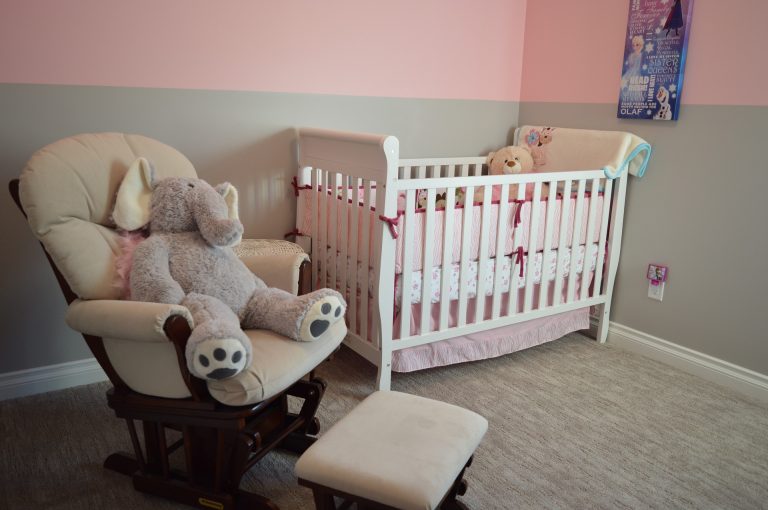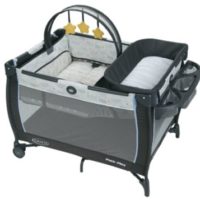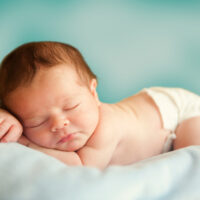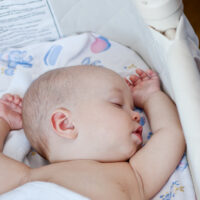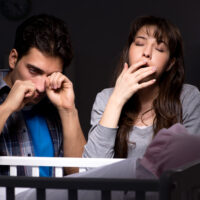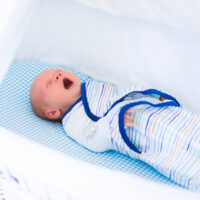Welcoming a tiny new member of the family can be an educational experience!
Within the first few weeks of hosting a newborn, you may wonder:
- Why does my baby continue sucking in her sleep?
- Should I change his clothes every time he spits up?
- What are those funny noises and half smiles she makes while napping?
- Is all of this normal?
There are also practical questions that relate to baby’s daily care. Because newborns spend a significant part of the day sleeping, one of those important questions is:
What is the best room temperature for my baby?
If you seek advice, you might get one answer from Great Aunt Ethel and a different answer from a mom peer. Researchers have answers, too. They suggest that a proper room temperature contributes to a baby’s sleep quality…and ultimately her safety.
The SIDS/Sleep Link
SIDS is always in the back of any parent’s mind. It’s such a mysterious and scary disease. While we don’t know the exact causes for SIDS, some links between environmental factors and the disease have been found. The current research shows a causal link between a child’s failure to complete basic body functions, like temperature regulation and cardiovascual activities, and SIDS incidences.
Sleep and temperature are 2 of those factors. Overheating, especially while sleeping, has shown to be a big risk factor for SIDS. Likewise, the sleeping position and bed of an infant can be a risk.
To practice safe sleep, always make sure that the baby’s room isn’t too warm. They hsould be comfortable without being hot. Also make sure that baby is always placed to sleep on their back and that they have a firm mattress with no extra bedding, padding, pillows, or blankets.
Factors for Infant Sleep Patterns
Sleep Needs of Infants
A baby who is one week old will sleep most of the day; often 16-18 hours.
A newborn’s sleep routine may be anything but routine. Babies nod off sporadically between diaper changes and feeding sprees. They may even interrupt their meals to snag another quick nap or two.
Many parents roll with their baby’s irregular patterns, hoping to steal an occasional nap while their baby slumbers. They wait for the day when their baby sleeps through the night.
Circadian Rhythm
The human sleep/wake cycle is controlled by circadian rhythms, which act as the body’s inner clock. This bio-clock is influenced by the amount of daylight and the body’s supply of the hormone melatonin. A baby’s sleep patterns are erratic, partly because their melatonin production system is not yet mature. At the age of three to four months, an infant starts to produce melatonin on his own.
Core Body Temperature
Core body temperature is another factor in a healthy sleep routine. A baby’s system is not yet proficient at maintaining an ideal core body temperature.
If a room is too warm, or if a baby is over-bundled, this can create a problem for baby’s core body temperature. An infant’s body will work hard to regulate core body temperature, which can result in shallow sleep.
Preterm babies may take longer than full-term infants to self-regulate their core body temperature.
Best Room Temperature for Babies
Experts advise keeping the baby’s room temperature at a level that feels comfortable for a lightly clothed adult, specifically between 6872F (2022.2C).
An infant who is too warm will not get quality sleep, and may be at greater risk for SIDS (Sudden Infant Death Syndrome), like we discussed above.
But how do you know if your baby is hot? Signs that a baby is too warm include: sweating, damp hair, flushed cheeks and restless sleep.
A room that is too cold has its hazards as well.
When the nose breathes cold, dry air, the mucus membranes must work harder to produce mucus. This can back up and overload the air passages, making baby’s breathing troublesome. This sinus blockage can also cause headaches, sore throat, coughing, or an ear infection.
If you are concerned that the room may be too cool for your baby, check the warmth of his torso or nape of the neck — not his hands and feet.
Safe Sleep for Baby
For a safe sleep environment, the National Institute of Health and the American Academy of Pediatrics recommends placing an infant to sleep on his back. Other sleep safety practices include:
- Use a firm, safety-approved crib mattress covered by fitted sheets.
- Free the crib and sleep area of pillows and stuffed toys.
- Keep your baby’s crib close to you, especially babies aged 0-6 months. The AAP advises against co-sleeping of any kind.
- Avoid blanket coverings and fluffy bedding as they can cause overheating during sleep.
- Sick babies often have fevers, which can cause additional overheating.
How to Get More Sleep
The right room temperature can help babies get the safe, quality sleep they need. Babies need sleep in order to develop, grow and stay happy. New parents need sleep, too (mostly just to stay happy). Parents are always looking for ways to get their little one settled without too much fuss and drama.
Here are some baby sleep tips:
- Add a bath to your baby’s bedtime routine, which can have a calming influence.
- Since light regulates our circadian (sleep) rhythms, lower the lights in the evening and keep things bright during his daytime naps.
- Put her to bed on a full stomach. Adding a few extra feedings in the evening can get your baby on the road to sleeping longer into the night.
- Give your baby a gentle massage before bedtime. Researchers say that babies who were gently massaged before bedtime got to sleep faster and slept more soundly.
- Encourage wakefulness during the daytime. Being active in the day, and quieting down when it’s getting dark will help babies build their sleep routine.
Infant Sleep Solutions
- If you have drafty rooms, check out the best space heaters for baby’s nursery, many of which are equipped with thermostat, fan option and child safety locks.
- For monitoring room temperature, it may be helpful to add a thermostat to your baby’s room, like the LittleHippo Kelvin Color Changing Nursery Night Light, which changes color when the temperature changes, and also monitors humidity in the room.
- The ThermoPro TP50 is a highly rated, all-purpose indoor thermometer for any room in the home.
- A baby monitor is considered essential equipment by many parents. Discover the top-rated monitors.
- If you’d like to give baby massage a try, here’s a favorite parent read: Baby Massage: The Calming Power of Touch, and with a bottle of Calendula Baby Oil you can start your own home baby spa.
